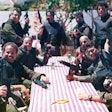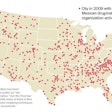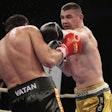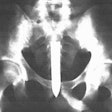Hard-core gang members function primarily in the underground economy. They survive on the income derived from their criminal activity. Few of them have the skills, discipline or desire to hold down a regular job in the legitimate American economy.
However, the lack of jobs and the failing American economy are what is often blamed by the national media and by psychologists and sociologists as the reason for gangs. The poor neighborhood culture of poverty does help form the "soup" from which gangs are spawned, but remember that 90% of the residents from even the worst ghetto or barrio successfully avoid gang membership.
Gang members belong to a gangster culture, believing that only lame punks do menial work for "the man." Why be a lowly worker, when you can be the boss? As a carjacker, burglar, armed robber, or drug dealer, you are the boss. You own your own business. You call the shots.
This mentality, which defies the seemingly sensible logic of psychologists and sociologists, is what causes programs such as Father Greg Boyle's Homeboy Industries to fail. There are a few well-documented successes from these job-training programs, but the great majority of hard-core gangsters fall back into this gang lifestyle of living off the grid. They return to the much easier life of crime.
In my experience, it's rare to see a hard-core gang member who maintains a legitimate job. In the few instances in which I have seen this, it was either required by the parole officer to stay out of prison or a legitimate front for criminal activity.
That doesn't mean I don't believe in trying to help former gang members leave the criminal lifestyle by getting them jobs. My brother was a foreman at a steel fabricating yard on First Street in East Los Angeles. He's a big guy, and he always had a good but tough reputation with his steel workers. He was in charge of hiring and firing and told me that he would make sure anybody I sent him would get hired, and my brother would take whoever I sent under his wing.
Over the next 20 years working gangs, I sent several dozen former and current gang members who expressed a desire to get a legitimate job to my brother. Only one guy actually showed up. He got the job, but quit the next day.
In both the Latino and African American community, most of the thousands of male hard-core gang members I came into contact with had no legitimate jobs. They usually lived off their mother, wife or girlfriend's income from legitimate or illegitimate jobs, and from the woman's welfare, child support and food stamps.
In the gang culture, each male is expected to have his own source of income. Not a job, but a "hustle." Traditional and respected hustle occupations include drug dealer, car thief, burglar, robber, counterfeiter, or pimp. Gang moochers, leeches, and members who are always borrowing from "working" gang members are not appreciated. Despite the myth of gang families sharing their spoils, bad things happen to moochers.
The only accepted "welfare" income in the gang culture is when a respected member is locked up in prison and is unable to generate his own income or do his "hustle." Homeboys free at home chip in and send cash to be put on the books for these gang members.
This form of gang welfare income is often forced upon fellow Homeboys by older veteran gangsters who have themselves often experienced being without income in prison. As the years slip by, these incarcerated welfare gang members are dropped from these welfare rolls and forgotten.
Drive around the barrio or ghetto neighborhoods and you will notice that there are some businesses that are flourishing. Bars, liquor stores and convenience stores specializing in liquor are abundant in these gang neighborhoods. Many of the liquor and "mom and pop" corner stores also sell drug paraphernalia such as rolling papers, glass tubes, and small plastic dope bags. Pawn shops and small auto repair shops are also common. These businesses are used to buy and sell stolen property from burglars and auto strippers, and these neighborhoods are where people go to buy illegal drugs.
The lack of income cannot be blamed on a lack of entrepreneurial skill or intelligence. In Los Angeles, gang leaders such as El Rader "Ray Ray" Browning from the Pasadena Denver Lanes, Michael "Harry O" Harris from The Bounty Hunters or "Freeway Rick" Ross from the Hoover Crips, built multimillion dollar drug organizations from almost nothing. These men might have become captains of industry if they had chosen to start legitimate businesses.
When someone from the gang culture is actually motivated to become a productive member of society, they can succeed. I've written about "Buzzard" of the Aryan Brotherhood who talked his way onto an oil rig and eventually became the foreman.
With no work history, no credit and a new identity, "Mundo" Mendoza of the EME (Mexican Mafia) has managed to work for 30 years. Compton Lantana Crip and BGF (Black Guerilla Family) associate Michael Robinson earned an honest living buying and fixing cars from police auctions after he defected from the gang. FBI Agent Tim Flaherty and I helped Mike finally buy his own tow truck and he became proudly self-employed until his death in 2006.
Related:
















